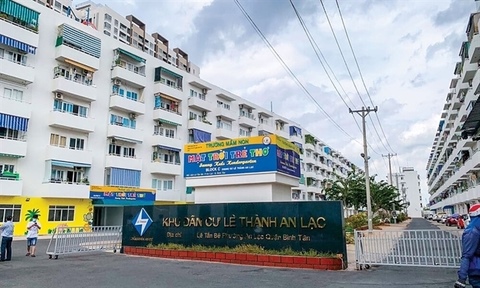|
HCM City seeks to build 35,000 social housing units
HCM City is seeking to build 35,000 social housing units with 2.5 million square metres of floor space by 2025, the People's Committee of the southern economic hub said.

An accommodation area for workers in HCM City's Bình Tân District. — VNA/VNS Photo
|
Around 7,000 apartments for lease with 500,000sq.m and 4,500 to be sold to workers with 220,000sq.m will be built by 2025.
It also plans to build 50 million sq.m of social housing by 2025 and 57.5 million sq.m in the following five years to increase housing to 10sq.m per person by 2025 and 12sq.m by 2030.
The city plans to develop about 15.5 million sq.m of floor space for social housing by 2025, and 21.4 million sq.m of floor space for commercial housing by 2030.
In the following five years from 2026 to 2030, the city will build 58,000 social housing units with 4.08 million sq.m of floor space, including 11.600 lease houses with 816,000sq.m of floor space and 8,000 accommodations for workers with 480,000sq.m of floor space.
By 2030, an additional 31.9 million sq.m of floor space for separate houses for households will be added.
The city has identified housing development as one of the most important factors in its socio-economic development.
It strives to address the bottlenecks slowing down development of social housing to meet the rising demand for affordable houses, create better living conditions to attract more high-quality workers and retain them to live and work in the city.
All sectors are encouraged to invest in housing development, especially social housing and low-cost housing.
The city prioritises the allocation of public investment capital from the State budget to social housing projects with lease or hire-purchase units, and seeks to increase the proportion of rental housing in the affordable housing segment.
Capital for the city’s housing development is expected to be raised from sources such as private enterprises, credit institutions, the accumulated capital of households and other sources.
Meanwhile, capital for social housing development will mainly be taken from private enterprises, preferential credits, and about 10 per cent of the city's budget.
Although some initial results have been achieved, in general, social housing development in HCM City has not been as effective as expected and goals have not been met due to many difficulties.
From 2021 until now, the city has only completed and put into use two social housing projects with a scale of 623 apartments. Currently, the city is implementing six social housing projects with a land area of 9.36ha with a total floor area of 298,714sq.m, 3,956 apartments and other worker accommodation projects in Thủ Đức City with an area of two hectares, with a total floor area of 93,932sq.m for 1,040 apartments.
Difficulties mainly arise due to complicated investment procedures for social housing projects such as the procedures for approving investment policies, recognising investors, approving detailed plans at a scale of 1/500, investment approval, land allocation, land use fees and additional procedures such as appraisal of the selling price of social housing, confirmation of buyers, lease-purchase of social housing, and cost audits to confirm the profit margin take a lot of time for the investor, so the desired progress has not been achieved.
There are also many other reasons such as social housing project investors are not proactive in securing capital sources, so the construction progress is long; the incentive mechanism for social housing investors is not attractive, so it does not attract many investors to participate; housing development projects serving workers have large investment capital, while the capital recovery period is quite long (from 10 to 15 years), making many investors hesitant.
The city plans to spend about VNĐ3.8 trillion (US$160 million) for social housing from now to 2025, and VNĐ8.6 trillion ($366.8 million) for social housing in the 2026-2030 period.
It will develop high-rise buildings, increase the proportion of apartment buildings, give priority to developing housing projects in new urban areas, limit new housing projects in the central areas, and create land funds for transport projects, public parks and parking spaces.
The municipal People's Committee has proposed to remove difficulties and obstacles in social housing construction related to site clearance, compensation, technical infrastructure investment, and other legal costs.
It has recommended the allocation of these costs to the land fund for social housing construction when investors of commercial housing projects hand over 20 per cent of their residential land fund to the State for social housing development.
The city also needs guidance on applying legal regulations on implementing social housing obligations when adjusting project implementation progress and on determining members of households as beneficiaries of social housing policies.
Bizhub
|